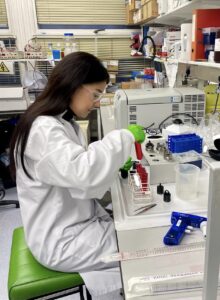ASTANA – Innovations in reproductive health may prove to be groundbreaking. In an interview with The Astana Times, Asselzhan Sarbalina, the first Kazakh doctoral researcher in medical science at Oxford University, shared ambitions to introduce cutting-edge practices in obstetrics and gynecology in Kazakhstan upon graduation.

Asselzhan Sarbalina.
Sarbalina’s ongoing research envisages the search for avenues in achieving natural childbearing among women afflicted by absolute infertility. Post-graduation, she is poised to return to Kazakhstan and contribute to the advancement of medical knowledge in Central Asia.
Scientific activities
Upon her arrival in the United Kingdom, the young medical professional discovered she was the first and only Kazakh citizen to be enrolled at Oxford University for a doctorate degree in medical science after submitting documents to the Obstetrics and Gynaecology Department and Academic Registrar Office.
The research she is conducting with Gothenburg University, Oxford University, and Kazakhstan’s National Center for Maternal and Child Health (NRCMCH) entails a transformative impact on women’s health on both national and international scales.
The expertise and resources of the renowned institutions, Sarbalina emphasized, will “elevate the research initiative to unprecedented heights.”
“With unwavering conviction, I anticipate that our collaborative efforts will culminate in a historic milestone, a groundbreaking surgical technique, which will be implemented in Kazakhstan for the first time,” she said.
Sarbalina noted that the project details are confidential for security reasons. At the same time, she added that the implementation of the medical practice will be unprecedented for the Commonwealth of Independent States (CIS) space.

The Oxford laboratory. Photo credit: Sarbalina’s archive.
Last year, Sarbalina received offers from Burnet Institute, Harvard University, Oxford University, and Stanford University. With a bachelor’s degree from the Medical University Astana and a master’s degree from the Nazarbayev University School of Medicine (NUSOM) she “heeded the counsel of inner conviction” prior to embarking on an academic journey in Oxford.
“I harbor disfavor for instances wherein individuals, bereft of requisite education in women’s health and devoid of professional experience, engage in discussions on this subject matter. It is my contention that specialization should be a prerequisite for involvement in discussions within a particular domain,” said Sarbalina.
Sarbalina is now working at the Women’s Center in John Radcliffe Hospital, a large tertiary teaching hospital in Oxford. She noted that “the open exchange of ideas and the freedom to interact with people in the scientific milieu” resonate with her personal and professional interests.
“I come from a modest background. My father worked in the oil industry and my mother is a dedicated cardiologist. My educational journey started in a simple public school in the city of Kulsary in the Atyrau Region in Kazakhstan. Growing up in conditions, where luxuries were scarce, I remained resolute in my conviction that I would ascend to the global stage of knowledge,” she said.
Women’s health in Kazakhstan
The data from the Catalan Institute of Oncology (ICO) and the Human Papillomavirus (HPV) Information Center of the International Agency for Research on Cancer (IARC) indicates that cervical cancer ranks as the second most frequent cancer among women in Kazakhstan.

The operating room. Photo credit: Sarbalina’s archive.
“The ongoing struggle against preventable complications, including pre-eclampsia, sexually transmitted diseases, infertility, and unhealthy sexual relationships, reveals a substantial lacuna in the authentic epidemiological situation of female reproductive disorders in Kazakhstan,” Sarbalina said.
Lack of awareness in sexual education, HPV vaccination, contraception, and pregnancy both among women and men paves the way for an increase in health disorders and indicates the need for reviewing approaches in discussing and covering respective topics.
“Addressing these persisting challenges mandates concerted efforts in augmenting educational initiatives, heightening public awareness, and implementing targeted interventions in the realm of female reproductive health,” she added.
To enhance access to healthcare for women in Kazakhstan and transfer knowledge to the country’s regions, Sarbalina suggested the opening of medical facilities in each administrative region analogous to Astana’s NRCMCH. The idea may prove to be a “prudent and strategic initiative.”
The Kazakh Ministry of Healthcare stated that over the last year, maternal mortality decreased threefold – 185 deaths in 2021 and 57 deaths in 2022. Between 2000 and 2020, Kazakhstan entered the top 10 countries with the highest percentage of reduction in maternal mortality rates.
In this regard, positive changes are observed throughout the Central Asian region – overall, Central Asia’s maternal mortality rate declined by 67.5% in the last 20 years, reported the United Nations Maternal Mortality Estimation Inter-Agency Group (MMEIG) in March this year. On the other hand, MMEIG specialists observe the maternal mortality increase in other parts of the world, for example, in Europe with a 17% growth from 2016 to 2020.
Life in Oxford

Matriculation in Oxford University. Photo credit: Sarbalina’s archive.
Apart from intense studies and work, Sarbalina recalled cultural events in Oxford. She brought an example of a recent meeting with Kazakh composer and Oxford visiting scholar Rakhat-Bi Abdyssagin and said that the “five-hour conversation immersed her into a discourse reminiscent of perusing an encyclopedic volume on quantum physics.”
On Dec.7-8, Sarbalina participated in a conference at Clare College, the second oldest college in the university.
“The event included a delightful dinner hosted in the Trinity College dining hall. An intriguing highlight of the visit was the observation of a replication tree, symbolizing Isaac Newton’s apple tree, adding a historical and intellectual dimension to the overall experience,” she said.
On top of that, Sarbalina has recently started studying Chinese, the sixth language for her to learn.
“It is the right time, the right place, and the individuals around me are the right people. I am optimistic about my plans, trusting in the divine will and guidance,” she said, reiterating the Chinese proverb that states “God willing, given the right time, place, resources, and people, things will come to pass.”

